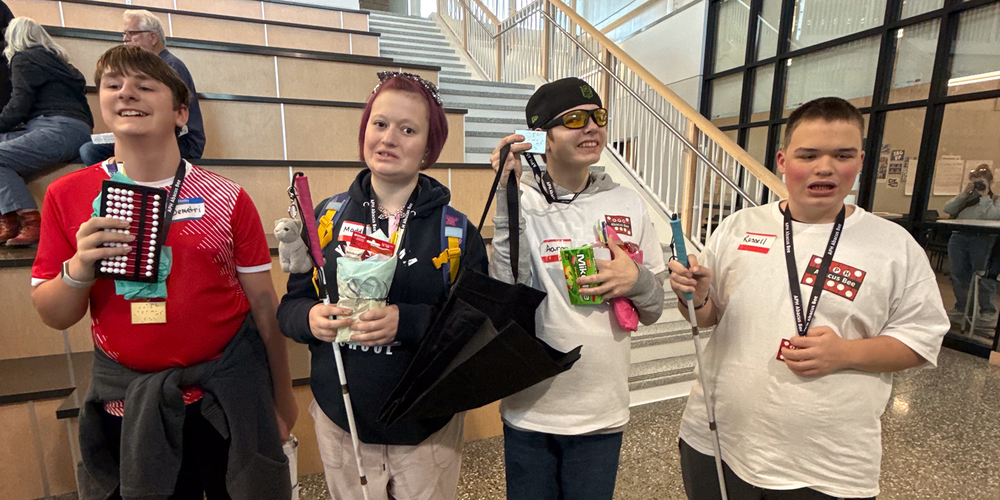Earlier this month, more than a dozen students from across the state gathered at Yasuhara Middle School for the third annual Washington Regional Abacus Bee, organized by the Washington State School for the Blind (WSSB) Outreach Access Services team in partnership with Spokane Public Schools, with support by the Washington Department of Services for the Blind and the American Printing House for the Blind (APH).
“It’s a math competition to encourage blind and visually impaired students in STEM (Science, Technology, Engineering and Math) fields, which are not fields that are always instinctive to these kids,” said Lonna Gately, a 22-year teacher in Spokane Public Schools Vision Services program.
Check out a photo slideshow of the event:
Washington Abacus Bee at Yasuhara Middle School
Spokane became the host city for this year’s event after two consecutive years in Vancouver – where the WSSB campus is located – and Seattle. Before last year’s Bee, WSSB Associate Director of Outreach Jessica Chandler invited Gately to attend Seattle’s event and if she would consider partnering to host in Spokane the following year.
“They do lots of events in Vancouver and Seattle and along the I-5 corridor, but very rarely come to Spokane for state-wide events,” Gately explained.
“I liked seeing my friend Yasmine again, I liked playing goalball, and I liked getting my medal at the awards ceremony.” - Madilyn Lund, 9th grade, North Central High School
For the past three years, Gately was located at Yasuhara almost full-time with three of her students, who now attend North Central High School, and thought it would be the perfect location for the Bee.
“Yasuhara is just a beautiful school that serves our need well, and they have welcomed our visually impaired students and staff into the building like one of their own,” she said.
So how does an Abacus Bee work?
The competition is held in rounds, starting with easier math problems using addition and subtraction, then advancing to multi-digit multiplication, then division to demonstrate their math skills and proficiency on using the hand-operated calculating tool that humans have used for thousands of years.
“For my completely blind students, when they do state testing and other kids can use paper and pencil, my students use an abacus,” Gatley explained. “Add, subtract, multiply, divide, fractions – they do everything on the abacus. They started learning when they were in kindergarten.”
The last round is The Space Race.
“Instead of reading the problem, the teacher says the problem out loud, so you’re trying to keep up with what they are saying, and all the kids do it together with parents watching.”
During most of the competition, parents and caregivers participated in Day of Code activities designed to highlight the Expanded Core Curriculum (ECC), including technology, self-advocacy, independent living, and recreation and leisure.
“It was really cool this year,” Gately observed. “They had all the parents report what their student’s visual acuity is, then made goggles based off that and were asked to do things, like how their students would do them.”
This allowed parents to understand some of the challenges their students experience and what skills their students use to make learning accessible.
“I liked being able to use the Dash Robot at the Abacus Bee. I was fascinated by how you could program it with the iPad app using VoiceOver. I also liked how the app would speak out every movement the robot made.” - Russell Winkler, 9th grade, North Central High School
The event also included a keynote speech from Dana Ibrihama, a Whitworth University student who is blind and studying computer science.
“It shows students ‘You can do this. This is not just for those other people. This is for us too,” Gatley added.
In the afternoon, Parasports Spokane hosted an adaptive sports session of Goalball, a fast-paced, team sport that centers blind and low vision athletes. The sport was developed as a rehabilitation activity for visually impaired World War II veterans in the 1940s and became a Paralympic event in 1976.
At the end of the event, students received prizes and celebrated their efforts. Four students from North Central and one student from Salk Middle School participated.
“A lot of kids are the only kids in their building that have a visual impairment, so they never get to be around other kids with visual impairments,” Gately said. “Or they feel like they’re really different because instead of using paper and pencil in class, they’re using an abacus. So it’s really great for the kids to do these kinds of activities and be with their peers. That builds a lot of community.”
The top performers from Washington will advance to the National Abacus Bee in Louisville, Kentucky in early 2026, joining students from 14 other states throughout the country. Qualifying students will be announced in December.

